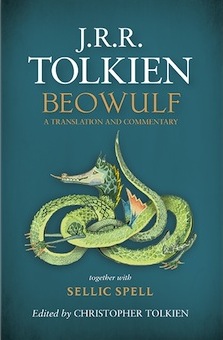Tolkien’s 1926 translation of Beowulf will be published after a nearly 90-year wait! The book, which is being edited by Christopher Tolkien and published in May, will include transcripts of lectures that Tolkien gave on the poem, as well as The Sellic Spell, a previously unpublished story that retells The Saga of Hrolf Kraki.
Tolkien spent years studying Beowulf, calling it “laden with history, leading back into the dark heathen ages beyond the memory of song, but not beyond the reach of imagination… the whole thing is somber, tragic, sinister, curiously real.”
Will Tolkien’s Beowulf supplant Seamus Heaney’s? Will his translation and lectures offer insights into his creation of Smaug? How will he tackle the opening salutation, “Hwæt,” which has been translated in so many different ways? We can’t wait to find out!











I already own several translations of Beowulf, along with Poul Anderson’s version of Kraki’s saga. What amazes me is how they keep digging up (and selling) unpublished scraps of vaguely mythological Tolkieniana.
Superb! I cannot wait. Tolkien’s scholarship is too-often overlooked in corpus.
Very cool to finally be able to read what Tolkien wrote . Christopher Tolkien keeps giving us more opportunities to read all of Tolkien’s notes and ideas.
Just wait til the Mouse gets it’s paws on this intellectual property too.
At least we get new things actually written by Tolkien and not new items by a family member with a Ghost Writer.
@@.-@: That’s true. I dread to imagine what LOTR sequels would be like…
1:
But Hwaet! There’s more!
@6: That’s actually pretty good. I wish I’d thought of that.
But Hwaet! There’s more!
ISTR Heaney talking about this problem – how do you translate “Hwaet” – and explaining that he settled on “So”, because that’s how his family would indicate “I am about to start a serious discussion”. Other translations went with “Listen!” or “Attend!” He also mentioned finding a Beowulf translation from the 1920s or so that translated it as “What-ho!” I would pay whatever was required to read “What-ho, Beowulf”.
@8: P. G. Wodehouse’s Beowulf! More seriously, I think that the “What-ho!” is in the 1892 Earle translation.